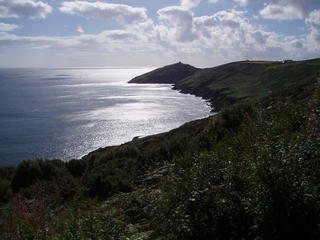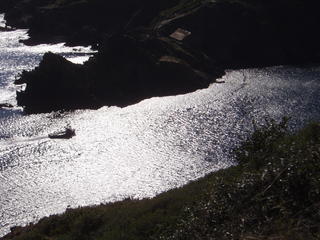Wednesday, August 31, 2005
Winning here
"Rather than focusing on killing insurgents, [coalition forces] should concentrate on providing security and opportunity to the Iraqi people, thereby denying insurgents the popular support they need".
How painful/ironic, then, is the coalition failure to anticipate the vulnerability of pilgrims on the Aima bridge approaching the Kadhimiya mosque.
The event looks unlikely to directly increase support for insurgents. Rather, it could undermine trust in the capability of the nominal central authorities. If this is the case, those who hoped to cause such panic look to have sound tactical sense.
But could the insurgents' actions backfire against them? For one thing, the sense of release among Shias, after suppression during Saddam's time, at being allowed to carry out major ceremonies freely may continue to be the overriding emotion, however great the immediate grief for the minority directly affected by the incident.
One thing that does appear to be the case is that there has not - at least so far - been a sectarian knock-on effect. Rather, nearby Sunni neighbours are reported to have come out in numbers to help in the face of a shared human tragedy.
Fukuyama on Iraq
Littered with shoes
The bridge, which spans the River Tigris, is littered with the shoes of victims.
Tuesday, August 30, 2005
The moral hazard myth
...
...The issue about what to do with the health-care system is sometimes presented as a technical argument about the merits of one kind of coverage over another or as an ideological argument about socialized versus private medicine. It is, instead, about a few very simple questions. Do you think that this kind of redistribution of risk is a good idea? Do you think that people whose genes predispose them to depression or cancer, or whose poverty complicates asthma or diabetes, or who get hit by a drunk driver, or who have to keep their mouths closed because their teeth are rotting ought to bear a greater share of the costs of their health care than those of us who are lucky enough to escape such misfortunes? In the rest of the industrialized world, it is assumed that the more equally and widely the burdens of illness are shared, the better off the population as a whole is likely to be. The reason the United States has forty-five million people without coverage is that its health-care policy is in the hands of people who disagree, and who regard health insurance not as the solution but as the problem".
The Moral Hazard Myth by Malcolm Gladwell, The New Yorker, 29 August
"The Republican War on Science"
A coalition of insurgents with brilliant strategic and tactical advisers threaten to overthrow a hard won constitutional settlement.
Welcome to the United States, where anti-science activists are the ulimate guerillas, who "win if they do not loose" (to borrow a phrase that Henry Kissinger has quoted in a different context).
Chris Mooney's new book The Republican War on Science documents the strategies and tactics of the religious right, some big business interests and their allies in the
(the formula includes: undermine science itself and suppress valid research; target individual scientists; rig the process; misrepresent and distort the argument; magnify uncertainty beyond reason; and portray the extreme fringe as central)
The book is especially timely given controversy over climate change and – in the
I value Chris’s clear, consistent and rigorous journalism for outlets such as The American Prospect and his own blog, and commissioned him for openDemocracy’s debate on the politics of climate change (see Kant and climate change).
TRWS should help to move the agenda forward, although the recommendations for what should be done (e.g. restore the Congressional Office of Technology Assessment; safeguard science advisory committees from political manipulation; reduce incentives for science politicisation; use the legal system to deter corporate abuse of science; raise journalistic standards; and politically oppose the anti-science right wing of the Republican Party) tend to undescore the sheer scale of challenges at least as much as they offer an actionable road map.
In particular, liberals should not underestimate the emotional pulling power and organisational smarts of those engaged in anti-scientific thought (see for example Beyond the News), which make it far from sure that, as Winston Churchill put it, “Americans invariably do the right thing, after having first exhausted every other alternative”.
At the same time, liberals should not forget the gross abuses and distortions to which a scientific, materialist view (including Darwinism) can, in some circumstances, be vulnerable, and which in the 20th century have contributed to world historical catastrophes.
No blind spot for the octupus
"Religious fervor is increasing across the world, including in the
Monday, August 29, 2005
Ground truth
..."On the green plastic wall of a portable toilet at
In
Two tsunami comments
1. Thousands of people were killed when the ... tsunami struck
2. A boxed comment in the article Ranking the Rich 2005 (Foreign Policy, Sep/Oct) notes that pledges of foreign aid to countries hit by last December's tsunami in the Indian Ocean ($5bn from private charities and goverment promises of more than $6bn) should be kept in perspective :
"Last year, the US Treasury raised $1.87bn in revenue from tariffs imposed on imports from the four major tsunami-affected countries (India, Indonesia, Sri Lanka and Thailand). That is twice the $908m in aid the US congress approved in May. In effect, the US will recoup its entire aid package...within six months. If rich countries really want to commit themselves to improving the lives of citizens in tsunami affected nations, they should end these taxes and other protectionist barriers".
Sunday, August 28, 2005
Beyond Katrina and New Orleans

As New Orleans is "threatened with potential catastrophe", more people are likely to ask whether anthropogenic global warming has made a difference, or - more to the point - could make more difference in future.
Rasmus Benestad concluded in his 5 August RealClimate post Storms and Global Warming II that "there is little evidence of a trend in the [Tropical cyclone] frequency, [but ] there are some indications of a trend in the destructive capability of the TCs".
So there could be more category five storms in future. Given its potentially high impact, Hurricane Katrina may concentrate more minds on whether it is...cost effective to go along with those who deny the scientific consensus on climate change.
Meanwhile the scenes from New Orleans push a number of emblematic buttons: the conduit for one third of US domestic oil production shut down; Interstate 10, which was converted on Saturday so that all lanes headed one-way out of town, in total gridlock; and a substantial proportion of the Louisiana National Guard is off in...Iraq.
Now you see it
Friday, August 26, 2005
Mr Wonderful returns
 Sunnis rally against Iraq charter.
Sunnis rally against Iraq charter.(More seriously, Wesley Clark repays attention with Before it's too late in Iraq - Washington Post, 26 August)
Climate lawsuit moves forward
This statement on 24 August looks like a significant development in the climate lawsuit (The judge's decision in full is here).
For context compare this from Myles Allen:
"This is not a lifestyle issue requiring detailed intervention in every aspect of our behaviour. It is a simple problem of waste disposal. The fossil-fuel industry has yet to implement an effective method of disposing of their key waste product, the carbon dioxide generated by the stuff they sell. As long as dumping it in the atmosphere was apparently harmless, it would have been a waste of their shareholders’ money for them to do so. But as the impacts of climate change become steadily more obvious, that situation is changing.
Past emissions of greenhouse gases, easily traceable to products sold or used by only a couple of dozen major corporations, very likely increased the risk of [damage by man made climate change] by at least a factor of two, and probably more like a factor between six and ten".
(Allen is refering to the 2003 European heatwave, but the same principles apply even if the risk numbers may be different)
The uses of sociology
Among the important insights Mulgan attributes to or at least connects with Tilley are the importance of “political entrepreneurs” in fomenting collective violence, and the identification of two common flaws in 20th century social thought: the tendency to see things too readily as systems, at one extreme, and soley in terms of individual motivation – e.g. as homo economicus – at the other. (The remedy to these flaws, Tilley is reported as suggesting, lies in looking at the local and immediate networks in which people are embedded in their every day lives).
Some of this kind of stuff has made it - at least in garbled from - into discussion and analysis by the commentariat, the political class and even in the pub. (Many would recognise the political entrepreneur for example, in the likes of Radovan Karadjic – or, for that matter, Abu Hamza, Abu Qatada and Omar Bakri).
But it is surely useful to learn more about the kind of rigorous, detailed and probably authoritative evaluation that Tilley has done. So thanks, Geoff!
All over again
It looks like they're right.
Thursday, August 25, 2005
Contract killer
The provision of public goods and large projects by or with substantial input from the private sector is often controversial. This has been particularly true with regard to provision of water services in developing countries.
Fredrik Segerfeld of the Cato Institute rehearses the familiar arguments of those who advocate greater private sector involvement in his 25 August FT piece The private sector can get water flowing to the poor.
As activists and others will be quick to point out, there is no shortage of examples where private contracts for water services provision have gone seriously wrong in practice. The reasons can be many and complex. I want to raise one relatively non-political point in what can be an over-politicised argument. That is, that at least one of the fundamental issues here is the design of contracts and incentive schemes (whether the contractor be public or private).
An interesting newish take on this was reported in The Economist (Blue Skies Thinking, 18 August) with regard to Terminal Five at Heathrow.
Of course if you think more air travel is a bad thing Terminal Five is not a public good. But please set aside what is being built for one moment and consider the how:
"[BAA] studied many badly-run projects from the past, which led it to the conclusion that the traditional idea that risk could be passed on to suppliers by means of complicated contracts was a fiction. 'If a supplier does a bad job, I might get a few million off him in compensation,' says [Tony Douglas, the man in charge]. 'That's great, but it doesn't get my airport built.' And, he says, traditional contracts tend to lead to a misallocation of resources: 'if you're a supplier, your best brains go into your legal department, so that when things go wrong you can write creative excuses. '
The Terminal 5 contract tries to align the interests of BAA and its suppliers so that risks can be managed properly. Risk payments, which are normally part of a supplier's quote, are instead put in a central pot. If a job is done on time, the firms get a cut. If there are problems, they are solved with money from the reserve. That also ensures that suppliers work together to sort out any snags, since problems caused by one firm cut the size of the bonus pot for the rest. Contractors share their books with BAA, which reduces the scope for waste (and creative accounting). The incentives seem to be working: BAA says that 80-85% of the jobs on site get finished on time, compared with around 60% for the rest of the building industry"
Britain's trauma, and Europe's
In one sense at least, and in spite of the massive difference in the number of deaths, British society was more deeply traumatised by the two London attacks bombings than Americans were in the aftermath of 9/11.
(see also Fin du Londonistan, Le Monde)
Csezlaw Milosz on Love
"Love means to learn to look at yourself
The way one looks at distant things
For you are only one thing among many.
And whoever sees that way heals his heart,
Without knowing it, from various ills—
A bird and a tree say to him: Friend".
Obsolete ideas
Foreign Policy asks 16 people to speculate on ideas, values and institutions they think may disappear in the next 35 years.
Fernando Henrique Cardoso: the political party
Peter Singer: the sanctity of life
Christopher Hitchens: the Euro
Shintaro Ishihara: Japanese passivity
John Brown: auto emissions
Lawrence Lessig: the public domain
Lee Kuan Yew: laissez-faire procreation
Richard Haas: sovereignty
The proper study
Governor General Warren Hastings, on the founding in 1784 of the Asiatic Society of Bengal (a "Society for enquiring into the History, Civil and Natural, the Antiquities, Arts, Sciences and Literature of Asia") - quoted by William Dalrymple in White Mughals.
Wednesday, August 24, 2005
Beijing's Great Game
"With breathtaking hypocrisy, US officials criticise
This is an odd analysis of
Financial Times, 24 August
Not only in the field

 "The purity and absolutism of refusal; the simplicity of struggle and the complexity of power; the guerrilla fighter and the guardian of the realm; the uber-macho military warrior and the calculating political strategist; pathbreaking nationalist and pioneer unionist – Wallace’s life encompasses a host of characters and qualities. He is a protean figure".
"The purity and absolutism of refusal; the simplicity of struggle and the complexity of power; the guerrilla fighter and the guardian of the realm; the uber-macho military warrior and the calculating political strategist; pathbreaking nationalist and pioneer unionist – Wallace’s life encompasses a host of characters and qualities. He is a protean figure".So writes David Hayes in his assessment of William Wallace in history, imagination and identity, published yesterday on the 700th anniversary of Wallace's execution.
The photos here illustrate a more straightforward narrative at the Wallace memorial in Smithfield, London on 23 August. Several hundred people attended the short event. It started with an address from David Ross, who has followed the route of Wallace's last journey for a film, and continued with drumming (lively, warlike, a touch of Afro-Celt to it) and bagpipes. The crowd was diverse - dressed in everything from medieval highland clothes to business suits - good natured, friendly and proud (scroll down).
The two ladies smiling at the camera are from near Burnley (Lancashire, not Lanarkshire). The hairy calf tatooed Pro Libertate is not one of theirs. It belongs to a messenger biker.
The passion and pride was deeply felt, but for by far the greater part this event did not feel like a toxic form of nationalism to me. 21st century identities can be both real and fluid - an aspiration championed in other circumstances by Daniel Barenboim, Edward Said and others. It's a nice touch, for example, that one of the pieces the West-Eastern Divan orchestra played in Ramallah on 21 August was the quintessentially English Nimrod. And the pockmarks in the stone around the Wallace memorial are from the Battle of Britain, which did more than anything else to fire British identity in the 20th century.




Fukuyama and language
The End of History and the Last Man by the conservative thinker Francis Fukuyama will be republished early in 2006, as will a new introduction by the author, The End of History Revisted.
Here's a quick comment on uses and abuses of language relating to two points in the Fukuyama mental framework 2005/06. One,
Point one: well yes, but the scientific process that Fukuyama so rightly values is under attack in the
Point two: the word "liberal" in the phrase "liberal democracy". This is complex, culturally-embedded word. Its meaning shifts over time. It cannot and should not be pinned down like terms in mathematics, chemistry or for that matter evolutionary biology.
But the Humpty Dumpty position ("words mean exactly what I want them to mean, neither more nor less") is not OK either. This is a small plea to reclaim liberal from some influential actors on both left (as in "neo-liberal imperialist") and, not including Fukuyama, the right (as in "liberal from Massachussetts") who abuse the term.
Tuesday, August 23, 2005
"Opinions Differ on Shape of the Earth"
Now (22 August), the Times itself makes the point with both the title and the text of In Explaining Life's Complexity, Darwinists and Doubters Clash.
Who needs Blockbuster
...when your local DVD makers can get new drama onto the streets within hours?
"One DVD features a young, blond muscular man who had been disembowelled. He was said to have been a member of a six-strong
Under US noses, brutal insurgents rule Sunni citadel (22 August) From Omer Mahdi in Haditha with additional reporting by Rory Carroll in
Monday, August 22, 2005
True Brit award
Determination, generosity of spirit, a sense of the absurd and no trace of fanaticism.
Strike "Brit". Call it the True Human award.
The wrong way of looking at the problem?
"Although Matthew Simmons says it is unlikely that the Saudis will be able to produce 12.5 million barrels a day or sustain output at that level for a significant period of time, [Sadad al-] Husseini says the target is realistic; he says that Simmons is wrong to state that Saudi Arabia has reached its peak. But 12.5 million is just an interim marker, as far as consuming nations are concerned, on the way to 15 million barrels a day and beyond -- and that is the point at which Husseini says problems will arise".
and
"The most worrisome part of the crisis ahead revolves around a set of statistics from the Energy Information Administration...[which] forecast in 2004 that by 2020
And the conclusion that [many US] "politicians [and others] remain in the dark" looks about right. (MEOW indeed. Recall: Campaign '80. Jimmy Carter: "Let's talk better mileage". Ronald Reagan: "Kill the bastards". Which message will resonate with voters? - The Onion)
But the following paragraph connects to flaws in typical ways of looking at the problem:
"High prices can have another unfortunate effect for producers. When crude costs $10 a barrel or even $30 a barrel, alternative fuels are prohibitively expensive. For example,
Point one: energy alternatives are viable [although probably at higher price than $40 per barrel Maass suggests]
Point two: world economy can probably afford this in the near to medium term without going into recession and can surely do so in medium to longer term.
Point three: potential to increase the efficiency of oil use is substantial, and "even" the US will respond if high prices are sustained. So envisage, for example, US imports remaining roughly constant or [slowly] declining even as miles driven increase.
Point four: weaning OPEC off oil is a necessary but almost impossibly difficult task. Chances of implosion/explosion in Saudi look high under most scenarios. Suggested ideal (probably impracticable): a world 'caretaker' body - with US, EU, Chinese, Indian and other major player participation - to help manage the transition under a total world carbon cap over [three?] decades (the prospects of political will for something like this, however remote, are greater if stability of Middle East as well as environmental issues are linked. An ODP plus plus).
Point five: don't forget that getting off oil will be good for everybody... so long as alternatives are not worse.
(see also What will they do with all the money? and How much carbon can we emit?)
No phoenixes here
"My own rough survey...has show three times as many new poems on blackbirds as on the Iraq war and 9/11..."
"...a robin that managed to make its nest in an unmade bed while its owner had breakfast; the highly territorial red grouse that forced a postman off his bike every day in Tomintoul; how looking at a stone curlew is believed to cure jaundice; why red kites' nests contain underwear with surprising regularity; and the gamekeeper who shot nightingales because they 'kept the pheasants awake at night'... "
"...Ninety million house martins drain out of Eurasia every autumn, but exactly where they go in Africa is unclear. Of all the 290,000 that have been ringed in Britain and Ireland, only one has every been recovered south of the Sahara".
(By the way, on 16 August a circuitous cycle ride from Dr Johnson's House to Shadwell Basin took me by the Tate Modern, where a pair of Peregrine Falcons are roosting about ninety metres up on the old smokestack. RSPB staff were on hand with high powered binoculars mounted on tripods, explaining the birds' behaviour in their new territory. The space between Giles Gilbert Scott's building and St Paul's cathederal is their theatre. It transforms the way you see the place.)
Fraulein Kampf
At home with the Wagners - Lucasta Miller reviews Brigitte Hamann's biography of Winifred Wagner.
Sunday, August 21, 2005
Coast path

 Plymouth to Polperro, late afternoon 19th to early morning 21st.
Plymouth to Polperro, late afternoon 19th to early morning 21st.At Rame Head, a Merlin (Falco columbarius) flew just a few feet above my head.
A little after 9pm on the evening of 20th a red full moon rose over a big calm sea. Viewed from about three hundred feet up a steep cliff face, it cast a red-golden reflection across the water for many miles. During the night the moon moved slowly from East to West over the sea, and set after dawn as white sailing boats one to two miles out traversed from West to East in a warm breeze.

Amazon Eden
From Trekking Through History - The Huaorani of Amazonian Ecuador by Laura M. Rival (Columbia University Press, 2002)
A challenge on human beginnings
And a challenge on futures:
"...people look at only three or four variables before making a decision. Bots can study hundreds, and refer back to a wealth of historical information on trading trends." (Money Making Machines).
"The town itself is dreary..."
From The Ballad of The Sad Cafe by Carson McCullers.
Thursday, August 18, 2005
Naomi not brilliant
"Thanks, Eva
Racism, ignorance and discrimination
As William Shawcross noted in his letter responding to Naomi Klein (see The force behind fanatics), self-described Islamists also target progressive internationalists like Sergio Vieira de Mello. Bin Laden made a special point of saying how glad he was that the man who helped
Caspar"
More thoughtful than Naomi Klein is Sameer Rahim in the 18 August edition of the London Review of Books:
Also, Faisal Devji in The Financial Times on A war fought for impersonal passions:
"The passion of the holy warrior emerges from the same source as that of the anti-war protester - not from a personal experience of oppression but from observing the oppression of others. These impersonal and even vicarious passions draw upon pity for their strength. And pity is perhaps the most violent passion of all because it is selfless enough to tolerate monstrous sacrifices".
Wednesday, August 17, 2005
Darwin, ID and the promised land
The Israeli journalist Daphna Baram (Disengagement and ethnic cleansing) is surely right: pressure to cleanse Israel and the West Bank of their Arab problem will grow.
US support for a facts-on-the-ground seems unlikely to diminish as the role of evangelical religion in US life looks set to remain strong.
At least three commentators have recently made a connection between assaults in the US on climate science and advocacy of intelligent design: Chris Mooney, Paul Krugman (Design for Confusion, 5 August) and George Monbiot (A life with no purpose, 16 August).
There is a Near East connection too: as ID becomes increasingly mainstream in the US, it will also become even less feasible to criticise the policies of the nation that - one must presume - has been chosen by The Intelligent Designer, especially if those policies are religion-based (see comment 1: The Rabbi Who Loved Evangelicals, and Vica Versa) .
Some conflict between US and Israeli identities and interests will persist. For example, stated US principles - liberty and justice for all (regardless of creed) - do not apply in Israel, however much Einstein might have hoped they would (see comment 2).
And although much military activity may be coordinated (as Dan Plesch and others have noted, George W Bush threatened Iran on Israeli television), there are likely to remain certain military secrets that the US will not wish to share, so it may be necessary for AIPAC to continue to collude with the agents of a foreign power.
On the other hand, where will an alliance of progressive forces come from? It looks as if Gaza has been set up to fail, but my hat is off to any optimists. Can, er, Hamas, Oxfam and James Wolfensohn (who has donated $500,000 of his own money to a consortium to purchase Jewish-owned greenhouses and hand them over to Palestinians) work together peacefully? I'm not laughing.
Stumbling over the stones
A 15 August BBC news story picks up on issues raised in Nick Robins’s Twenty trillion dollar question, published on 3 June in the debate on the politics of climate change. But it doesn't go far enough.
For example, it mentions an estimate that greenhouse gas emissions from the
The BBC piece does have some uses, though, as a contribution to general awareness raising. For example, it refers to this 11 July Letter from Institutional Investors to the Electric Power Sector, which looks like another important, albeit small step.
The financial community is one of the "stones" identified in my 8 August article for a forthcoming issue of New Humanist magazine. The editor has kindly agreed that I can pre-publish it on this blog. So if you want a sneak preview (of last week or next month, depending on your point of view), read the attached comment.
A couple of points further to the article:
One, the "groping the stones" metaphor: I owe this to Christine Loh at Civic Exchange (who I first met in Hong Kong last June on the way to Palau, and interviewed here and here). We've talked a little about the climate change issue in China, and she still thinks a good tactical approach for now is via campaigns on air quality (something that "Angel Green" seems to agree with).
Two, the article is fairly dismissive of "peak oil". For some, this probably needs further explanation (MarkLynas, for example, has said he'd be glad if I'd write something about it).
I've argued previously that the analysis Running on Empty (Jan 2004) remains broadly correct (and I do note George Marcus's comments on peak oil in the article linked in this post earlier today). Taking it from there:
There are significantly larger contributory factors to high oil prices on a relevant timescale than an oil peak. Among these are a lack of production capacity and geopolitical instability. If oil goes to $100 a barrel or even $150 (the level Bin Laden has called for) in the next few years it won't be because markets are pricing the depletion of long term reserves.
Further, expensive oil can be good news for the environment (but not, in the near term at least, for poor countries that import it) if it drives efficiency improvements. By itself, however, dwindling, more costly oil is not going to solve climate change, as there is more than enough coal to burn (as a solid or convertible to liquid or gas) to fry the planet.
What will they do with all the money?
George Magnus, a senior economic adviser at UBS, argues that the world is heading for a shock over the high price of oil (FT, 16 August):
"...what if oil prices were to remain high over the medium-term? The impact one year ahead, for example, of a permanent change (from $45 this time last year) to today's levels above $60, with all things constant, would be to cause GDP to fall by 1-2 per cent in South Korea, Taiwan, Turkey and South Africa and by up to 1 per cent in China, most of Europe, Japan and the US. The effect on already stressed current account positions would be to push the
The overall net transfers from oil consumers to oil producers by 2007 are estimated at about $1,500bn - or nearly 3.5 per cent of world GDP. This would amount to a recycling problem of increasing complexity, from both an economic and a political point of view."
Let's say 3% of $1,500 billion for Wahabist or Salafist teaching - $45bn; and 0.5% for violent jihad - $7.5bn.
A virtual Pomona
The Marcher site also has an essay by John Powell on apples in Welsh literature. An extract:
In the Afallennau, a tree (or series of trees) is praised at the start of each verse, before launching into prophecies. Merlin seems to be seeking protection amongst the trees, and perhaps to need their assistance in inspiring his foresights:
Sweet apple-tree with branches sweet,
fruit-bearing, much valued, famed...
...Sweet apple-tree, luxuriant green, with laden branches...
...Sweet apple-tree that grows on the river bank -
...no steward can reach its glistening fruit...
Sweet apple-tree with flowers foxglove pink.
Monday, August 15, 2005
Saudi tsunami
Wilcke now works with Human Rights Watch, studying Saudi Arabia from a base in New York. He proposed a series for openDemocracy on political and democratic prospects in Saudi. Now I'm not for the moment working with oD, I passed on the recommendation (hello? is there anybody home?).
There has been some remarkable journalism on this topic recently, with Bill Law's Saudi Stories.
How accurate and useful was and is the assessment by Robert Baer published in May 2003 (and recently linked near the top of Arts & Letters following the death of King Fahd)?
Baer wrote:
"If an election were held in Saudi Arabia today...Osama bin Laden would be elected in a landslide—not because the Saudi people want to wash their hands in the blood of the dead of September 11, but simply because bin Laden has dared to do what even the mighty United States of America won't do: stand up to the thieves who rule the country.
Saudi Arabia today is a mess, and it is our mess. We made it the private storage tank for our oil reserves. We reaped the benefits of a steady petroleum supply at a discounted price, and we grabbed at every available Saudi petrodollar. We taught the Saudis exactly what was expected of them. We cannot walk away morally from the consequences of this behavior—and we really can't walk away economically. So we crow about democracy and talk about someday weaning ourselves from our dependence on foreign oil, despite the fact that as long as America has been dependent on foreign oil there has never been an honest, sustained effort at the senior governmental level to reduce long-term U.S. petroleum consumption".
Sunday, August 14, 2005
Lenin at the Proms
Next week, the orchestra plays in Ramallah.
Comrade Lenin was suspicious of the power of great music to bring people together, preferring what he deemed unsentimental hard headed scientific socialism. The results were catastrophic.
I'll go with the music, with all the passion and intelligence it represents.
Im Osten etwas neues
Ahead of the deadline for what Frank Rich calls a shotgun constitution, two stories from the Washington Post worth a look:
U.S. Lowers Sights On What Can Be Achieved in Iraq reports senior administration officials as saying that they no longer expect to see a model new democracy, a self-supporting oil industry or a society in which the majority of people are free from serious security or economic challenges.
Iraqi Sunnis Battle To Defend Shiites reports local Sunni Muslim tribes defying attempts by Abu Musab Zarqawi to drive Shiite residents from Ramadi.
What, if anything, does this portend for Charles Krauthammer's Neoconservative Convergence?
Friday, August 12, 2005
The island above all others
Among the things I'd like to know more about is how the gaseous hydrogen will be made liquid and stored, transported and used, and what this will cost? Also, what are the prospects for livelihoods and wealth generation?
I was lucky enough to go to Unst in '96, when I managed to convince my producer at Costing the Earth that we should do a feature on environment and livelihoods, with a focus on Shetland.
I loved it. The people - with a very hard past that has made them resourceful, but a relatively enchanted present - are fantastic. The landscape is like no other I know. Driving across Unst, for example (I was on the way to visit the recently opened Zetnet office, I think), was like coasting over some part of some ur-brain - a landscape that resembles or perhaps even is something in the deep subconscious mind.
On Google Earth it's just about 60.45 N, 0.53 W
Goalkeepers of Sierra Leone
Twenty one-legged men play in the two teams, just opposite the building housing the UN special court in Freetown. The two goalkeepers have a hand each. All the players had their limbs amputated in the civil war (in which about 50,000 died and, if I recall correctly, some roadblocks were marked with intestines from recently dispatched civilians stretched across the path).
Jabatie Mumbu, one of the goalkeepers, talks about the importance of not being sad, and just getting on with life.
Schizophrenia at The Economist
But, this being The Economist, the article finishes with a facile paragraph that has more to do with denial than reasonable doubt:
"...The [climate] system itself is incredibly complex. There is only one such system, so comparative studies are impossible. And controlled experiments are equally impossible. So there will always be uncertainty and therefore room for dissent..."
Yes, and evolution is "only a theory".
Thursday, August 11, 2005
Bird in bag

European white stork Ciconia ciconia trapped in a plastic bag at a landfill site in Spain. Photo by John Cancalosi, Still Pictures.
Justice
"A dictum attributed to Ibn Taymiya, a renowned Muslim scholar born seven centuries ago, states that God will lend victory to a just nation even if it is infidel and bring defeat to the unjust even if they are Muslim. When the west loses its values of justice, it will be defeated in the long run".
Saad al-Fagih, director of the Movement for Islamic Reform in
21st century mustelid

Taking a break from writing an article on practical approaches to climate change for New Humanist editor Caspar Melville, and trying to decide whether or not to allocate time to read Richard Haass's The Opportunity, I took a copy of Brian Urquhart's review to read beside the river yesterday.
Urquhart seems to like the book, but points to what sounds like its most important lacuna:
"One gets little sense...of the problems posed by the social and political forces in the country [the US] whose policies he wants to change."
"Some of the issues Haass addresses are of decisive importance to the future of the human race", writes Urquhart. "They will require solutions far more drastic and imaginative than anything that can be agreed on at present".
The challenge is at least as great as that faced after World War Two. Poignantly, Urquhart (who is a former UN Undersecretary General) reflects on the extraordinary vision and determination of the generation that created the United Nations:
"As an ex-military, newly recurited member of the UN Secretariat, I well remember the righteous wrath that the least breath of skepticism about achieving [an end to armed conflict] aroused among the members of the early US delegations ot the UN, which included such people as Eleanor Roosevelt and Adlai Stevenson."
The contrast to the present leadership is almost too horrible to contemplate - but not quite.
So why the picture of a stoat? Well, lost in thought about just what it would take for this and future generations to rise to the challenges Haass and Urquhart identify, I suddenly realised there was a rustling in the undegrowth less than two yards from where I was sitting. Out popped a stoat. It ran right up - wonderful nimble movement - and stared at me. Only when I moved my upper body did the animal hop away again. And even then it came back for a second look.
So, at the grand old age of 42, I finally got to see this beautiful animal in the "wild" (well, the Oxford tow path). It cheered me up.
(The photo, by the way, comes from a site at the University of York that is supported by ExxonMobil and the Chemical Industries Education Centre!).
Nightmare come true?
A vast expanse of western Sibera is undergoing an unprecedented thaw that could dramatically increase the rate of global warming, climate scientists warn today.
…an area of permafrost spanning a million square kilometres - the size of
The area, which covers the entire sub-Arctic region of western Siberia, is the world's largest frozen peat bog and scientists fear that as it thaws, it will release billions of tonnes of methane, a greenhouse gas 20 times more potent than carbon dioxide, into the atmosphere.
It is a scenario climate scientists have feared since first identifying "tipping points" - delicate thresholds where a slight rise in the Earth's temperature can cause a dramatic change in the environment that itself triggers a far greater increase in global temperatures.
(Warming hits "tipping point", 11 August)
"This is an ecological landslide that is probably irreversible and is undoubtedly connected to climatic warming"
(Sergei Kirpotin, reported by Fred Pearce in Climate warning as Siberia melts, 13 August)
Wednesday, August 10, 2005
"Archbishop Backs Nuns in Pub Fight"
I didn't buy a copy, so don't know if he was using a broken glass, a chair leg or a copy of the Book of Common Prayer.
Even better images are conjured up by a menu from a Tajik restaurant reported by Flora Roberts in her blog from Afghanistan:
Salads
Meat allsorts
Custom-made salad (under a furcoat)
The cooked meat
The first dishes
Lag man (portion)
Lagman (floor of a portion)
The hen broth
The second dishes
Cutlets on Kiev
The forse meat shish kebab
The furnase pies
Garnish
Potato free
Rise
Drinks and juices
Drink from a dogrose
Doug
Spirits drink
Vodka “Orion”
Ligueur “Merri Giyoh"
Tuesday, August 09, 2005
Rebranding G.W.O.T
You had to be a careful reader of the inside pages of the [New York] Times last week to notice that America is no longer fighting the global war on terrorism. The Administration has replaced, or revised, or exapanded the G.W.O.T. with a new phrase: " a global struggle against violent extremist". The war is now a struggle. The terrorist enemy is now the violent extremist enemy. The focus has shifted from a tactic to an ideology.
This is an indication, Packer argues, that the Administration is admitting that its strategy since September 11th has failed - without really admitting it. The answer to Donald Rumsfeld's candid question in a memo of October 2003 ("Are we capturing, killing or deterring and dissuading more terrorists every day than the madrassas and radical clerics are recruiting, training and deploying against us?") is no.
But, he says , no one should imagine that an American departure from Iraq will end suicide bombings there or anywhere else:
Just as the jihadis in Afghanistan did not retire after expelling the Soviets fifteen years ago, the withdrawal of the superpower will not be enough for this generation of insurgents, either.
(The New Yorker, 8 & 15 August)
Monday, August 08, 2005
Home
 As the Israeli government prepares for the voluntary or involuntary evacuation of settlers from Gaza, a small detail that caught my ear in a BBC radio broadcast was that new houses being built in Israel proper for the relocated settlers are being surrounded with well-watered, landscaped lawns so that the settlers will feel "at home".
As the Israeli government prepares for the voluntary or involuntary evacuation of settlers from Gaza, a small detail that caught my ear in a BBC radio broadcast was that new houses being built in Israel proper for the relocated settlers are being surrounded with well-watered, landscaped lawns so that the settlers will feel "at home".Another nice touch is Banksy on the wall.
Origin of a catastrophe
- from Tides of War (Letter from Sri Lanka) by Philip Gourevitch, The New Yorker, 1 August
Friday, August 05, 2005
Relaxing
Commemoration at al-Khoei foundation
There were speakers and prayers from senior representatives of the Church of England, the Catholic and Greek Orthodox Churches, the Jewish community, Shia and Sunni preachers, Hindu, Sikh and Buddhist leaders and others.
A lot to reflect on. I don't have time to do it right now. Two or three things quickly:
- The grief and in some cases anger of people of such diverse backgrounds who have made their homes in Britain or grown up here in non-indigenous traditions at the attacks on the country and the city they love as well as on the beauty that the find in their lives through faith.
- Mehri Niknam of the Maimonedes Foundation on the desecration of "her beautiful beloved" (God), reading from Hafez and Rumi in Persian and talking of the glories of wine (unusual in a mosque, I guess)
- Prof Daoud Noibi of the Nigerian Muslim Association - a powerful man (slightly resembling Morgan Freeman) whose voice was on the edge of tears.
Mind the gap
Nationalist movements, including Arab nationalism, veered towards a leftist idiom, as in Gamal Adbel Nasser's "Arab socialism", and the Ba'ath Arab Socialist Party, borrowing heaving from Marxist motifs and vocubulary. The failure of these movements, then the collapse of communism and the Soviet [Union] made these idioms increasingly redundant
Sami Zubaida.